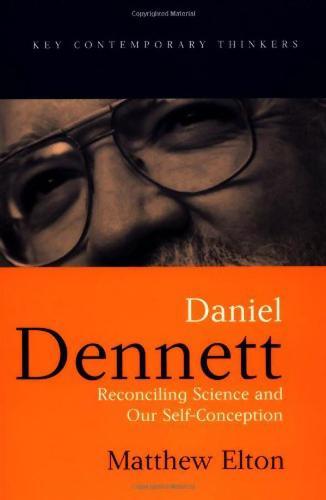Overview
Daniel Dennett is one of the most influential thinkers at the interface between philosophy and science. This book is the first comprehensive examination of Dennett’s ideas on the nature of thought, consciousness, free will, and the significance of Darwinism. A highly original introduction to contemporary thinking about the relationship between mind and science. This is the first comprehensive examination of Dennett’s ideas on the nature of thought, consciousness, free will, and the significance of Darwinism. Examines Dennett’s unique response to the question of when and how science should affect the conception that we have of ourselves. Casts new light on specific controversies: Could robots ever think, feel, and enjoy freedom? Does Dennett really explain consciousness? Are mental states real or merely ‘useful fictions’? Do we have free will? Is the self a ‘centre of narrative gravity’?
Full Product Details
Author: Matthew Elton (University of Stirling)
Publisher: John Wiley and Sons Ltd
Imprint: Polity Press
Dimensions:
Width: 15.20cm
, Height: 2.20cm
, Length: 22.90cm
Weight: 0.454kg
ISBN: 9780745621173
ISBN 10: 0745621171
Pages: 312
Publication Date: 25 July 2003
Audience:
Professional and scholarly
,
Professional & Vocational
Format: Paperback
Publisher's Status: Active
Availability: Out of stock

The supplier is temporarily out of stock of this item. It will be ordered for you on backorder and shipped when it becomes available.
Reviews
"Elton's book will be an invaluable companion for anyone hoping to get to grips with Dennett's rich and expansive vision." David Bain, The Philosophical Quarterly April 2005 'For over thirty years Daniel Dennett has been among the most important, innovative and engaging philosophers in the world. With the appearance of his book, Consciousness Explained, in 1991, his fame and his influence spread throughout the academic world and beyond. While there has been a great deal written about Dennett's ideas, until now we have had no systematic, integrated account of the "real patterns" that run through Dennett's philosophy. Elton's clear, readable and well-informed book provides just such an account. This is the ideal book for readers - and they are many - who've been captivated by reading Dennett's work and want to understand how the themes that he explores with such intellectual exuberance fit together in an integrated account of human agents and the sciences that study them.' - Professor Stephen Stich, Department of Philosophy and Center for Cognitive Science, Rutgers University 'This is an excellent introduction to the twists and turns of Dennett's thinking. In guiding the reader through a luminous yet sometimes puzzling maze of images, empirical excursions, thought experiments and hard arguments, Matthew Elton lays bare the deep unifying agenda that animates all of Dennett's work. Combining the roles of careful critic and generous host, Elton's patient excavations will help the novice and excite the expert.' - Professor Andy Clark, Director of the Cognitive Science Program, Department of Philosophy, Indiana University
Elton's book will be an invaluable companion for anyone hoping to get to grips with Dennett's rich and expansive vision. David Bain, The Philosophical Quarterly April 2005 ?For over thirty years Daniel Dennett has been among the most important, innovative and engaging philosophers in the world. With the appearance of his book, Consciousness Explained, in 1991, his fame and his influence spread throughout the academic world and beyond. While there has been a great deal written about Dennett?s ideas, until now we have had no systematic, integrated account of the real patterns that run through Dennett?s philosophy. Elton?s clear, readable and well-informed book provides just such an account. This is the ideal book for readers ? and they are many ? who?ve been captivated by reading Dennett?s work and want to understand how the themes that he explores with such intellectual exuberance fit together in an integrated account of human agents and the sciences that study them.? ? Professor Stephen Stich, Department of Philosophy and Center for Cognitive Science, Rutgers University ?This is an excellent introduction to the twists and turns of Dennett?s thinking. In guiding the reader through a luminous yet sometimes puzzling maze of images, empirical excursions, thought experiments and hard arguments, Matthew Elton lays bare the deep unifying agenda that animates all of Dennett?s work. Combining the roles of careful critic and generous host, Elton?s patient excavations will help the novice and excite the expert.? ? Professor Andy Clark, Director of the Cognitive Science Program, Department of Philosophy, Indiana University
Eltona s book will be an invaluable companion for anyone hoping to get to grips with Dennetta s rich and expansive vision. David Bain, The Philosophical Quarterly April 2005 'For over thirty years Daniel Dennett has been among the most important, innovative and engaging philosophers in the world. With the appearance of his book, Consciousness Explained, in 1991, his fame and his influence spread throughout the academic world and beyond. While there has been a great deal written about Dennett's ideas, until now we have had no systematic, integrated account of the real patterns that run through Dennett's philosophy. Elton's clear, readable and well--informed book provides just such an account. This is the ideal book for readers -- and they are many -- who've been captivated by reading Dennett's work and want to understand how the themes that he explores with such intellectual exuberance fit together in an integrated account of human agents and the sciences that study them.' -- Professor Stephen Stich, Department of Philosophy and Center for Cognitive Science, Rutgers University 'This is an excellent introduction to the twists and turns of Dennett's thinking. In guiding the reader through a luminous yet sometimes puzzling maze of images, empirical excursions, thought experiments and hard arguments, Matthew Elton lays bare the deep unifying agenda that animates all of Dennett's work. Combining the roles of careful critic and generous host, Elton's patient excavations will help the novice and excite the expert.' -- Professor Andy Clark, Director of the Cognitive Science Program, Department of Philosophy, Indiana University
Author Information
Matthew Elton is a former Lecturer in Philosophy at the University of Stirling.



